Da Nang After many years working as a nurse at the Dermatology Hospital, Mr. Tran Van Dung quit his job and returned to his hometown to raise black apple snails, generating revenue of billions of dong each quarter.
Early in the morning of the first day of August, Mr. Dung, 38 years old, rode his motorbike more than 4 km from his house in Hoa Phu commune to the snail farm in Hoa Khuong commune, Hoa Vang district. Because he rented land next to a rice field, he had to follow a winding dirt road to reach three ponds covering more than 5,000 square meters.
The sunburned man walked around the pond, occasionally picking up a few snails clinging to the roots of the duckweed to check for intestinal diseases. "If a snail is sick, it must be treated immediately so as not to affect the others," he explained.
Pointing to a pond full of duckweed, he said he had released 180,000 snails, and 50 kg of vegetables and fruits each day. After more than 3 months, the snails matured and were sold. If snails in other ponds were scarce, traders would buy the entire pond, drain the water, and catch the snails. If the supply was abundant, they would choose the feeding time to buy the big snails first.
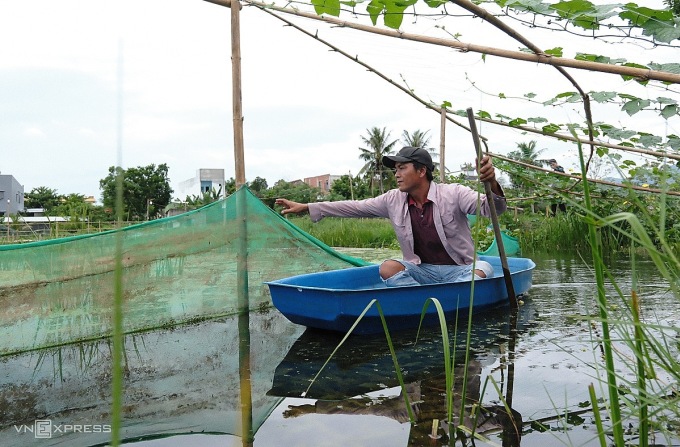
Mr. Tran Van Dung rowed a boat to check the organic black apple snail farming pond in Hoa Khuong commune. Photo: Nguyen Dong
Mr. Dung graduated from the College of Medicine and Pharmacy (now the University of Medical Technology and Pharmacy of Da Nang), then worked as a nurse at the Da Nang Dermatology Hospital. Originally a farmer's son, he wondered why the golden apple snail, an invasive alien species, was increasing in number, but the black apple snail, a common field snail in Vietnam with sweet, crunchy meat, was decreasing. "Why not raise black apple snails?" he asked himself and researched.
In 2019, Mr. Dung chose a different path - quitting his medical job to return to his hometown to raise black apple snails. "I found that the nursing profession was stressful and the income was not high, so I decided to return to my hometown to raise snails to have more time for my family and contribute to creating a clean food source," Mr. Dung explained.
With the support of his wife, who also works in the medical field, and his parents, Mr. Dung borrowed capital and learned more techniques from some snail farmers in Hoa Tien commune and started raising snails in tarpaulin-lined ponds. He made a profit of several tens of millions of dong from the first batch he sold, but then he tasted bitter fruit because "I was too greedy and released snails at a high density, causing them to die en masse." After the failure, he decided to raise snails in natural earthen ponds.
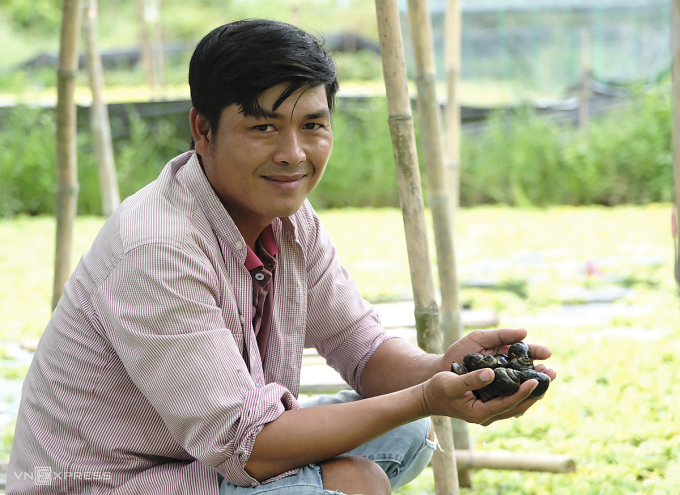
Mr. Dung with a batch of mature snails, waiting to be sold. Photo: Nguyen Dong
He rented three ponds and set up a new ecosystem. The bottom of the pond was dredged, minerals added, lime spread, and dried for 5 days. Then he filled the pond with water and treated the middle layer by raising algae to help filter the water and add food sources for the snails. He planted duckweed, water lilies, and built a trellis of squash above to create a roof.
Snails are fed with duckweed, vegetables, tubers, and fruits. Every day, Mr. Dung walks around the three ponds to check and feed the snails. He does not build a house in the pond next to the field, but installs cameras to monitor everywhere and at all times.
According to Mr. Dung, the most difficult thing about raising black apple snails is stabilizing the ecosystem for them to grow, the most worrying thing is that when it rains heavily, the PH level will exceed the threshold and kill the snails. After the historic rain in October 2022 in Da Nang, the water overflowed the banks, 2/3 of the snails in the pond crawled out, the rest gradually died due to the sudden change in their living environment.
After collecting the discarded shells, Mr. Dung started raising them again, gradually gaining experience such as: The stocking density should not exceed 50-70 snails/m2, the water source must always be stable and unpolluted. Because he takes advantage of the water source from the canals and irrigation ditches flowing from Dong Xanh and Dong Nghe lakes, he has to keep an eye on the water so that it does not enter the lake when farmers spray pesticides on the rice.
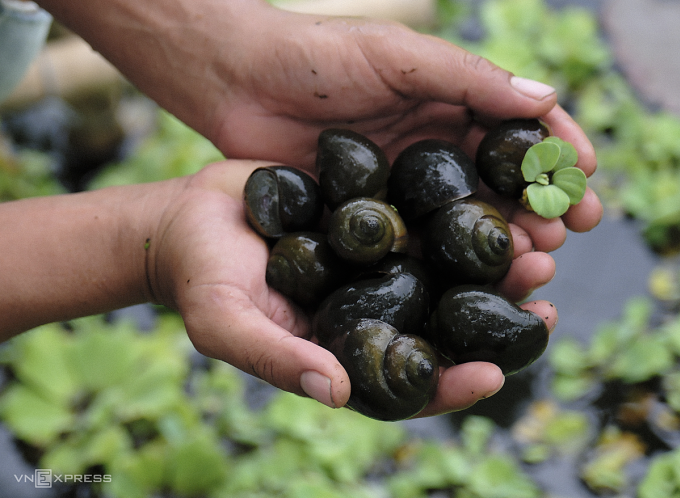
Adult black apple snails weigh about 30/kg, sold for 80,000-90,000 VND/kg. Photo: Nguyen Dong
Over the past 10 months, Mr. Dung's ponds have been stable, selling an average of dozens of tons of snails every 3 months, at a price of 80,000-90,000 VND/kg, with a revenue of billions of VND. He also sells eggs and snail seeds to other ponds. He reinvests the profits into the ponds, planning to expand the scale to one hectare.
"I am planning to make snail products such as snail sausages and grilled snails. Selling them will have high value and bring in a stable income," said Mr. Dung. Although the job of raising snails often requires him to be out in the sun and his hands and feet are dirty, in return he does not have to endure as much pressure as when he was a nurse and has more time to take care of his four children when his wife has to work nights at the hospital.
Together with Mr. Dung, the black apple snail farming model is developing in Hoa Vang district with farms in Hoa Tien, Hoa Phong, and Hoa Khuong communes, providing additional food sources for restaurants in the tourist city.
Source link














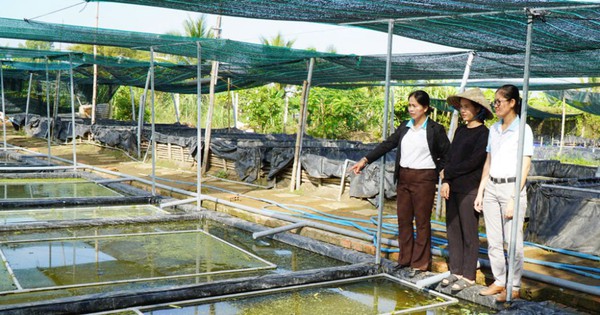

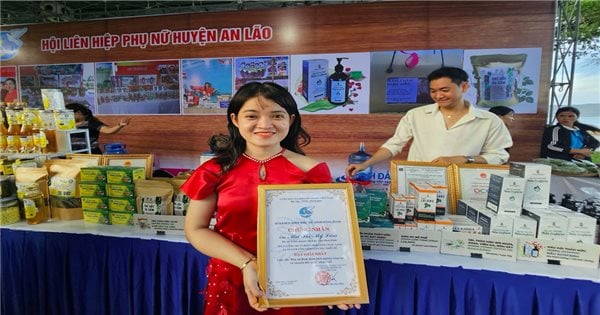



























![[Photo] Prime Minister Pham Minh Chinh chairs Government Conference with localities on economic growth](https://vstatic.vietnam.vn/vietnam/resource/IMAGE/2025/2/21/f34583484f2643a2a2b72168a0d64baa)

























































Comment (0)